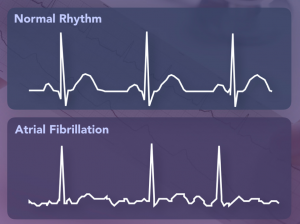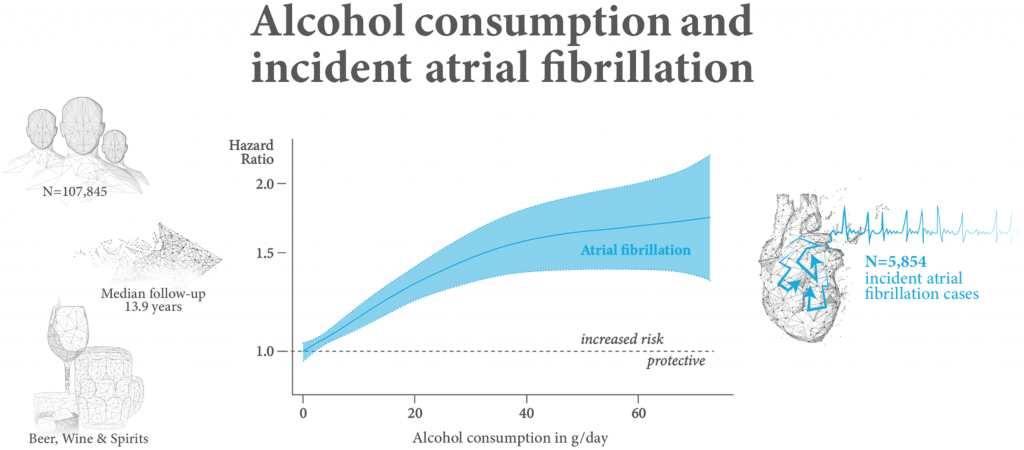This happens quite often: people come home after a long, tiring day and look forward to cracking open a beer, making a cocktail or pouring themselves a glass of wine. Sure, this may be an evening ritual for many, but at what cost? A recent study led by consultant cardiologist, Professor Renate Schnabel, at the University Heart and Vascular Center determined that people who regularly enjoy small amounts of alcohol develop an increased risk of atrial fibrillation (AF).
What is atrial fibrillation?
In simple terms, atrial fibrillation is when a person has an abnormal heart rhythm. The two upper chambers of the heart, the atria, beat out of sync from the two lower chambers, the ventricles. The irregular heartbeat caused by atrial fibrillation can lead to problems such as strokes or heart failure.

Atrial Fibrillation vs. Normal Sinus Rhythm on Electrocardiogram. Source: Clearvue Health
Here is a video which gives an overview of atrial fibrillation:
Developing the study
Researchers followed a sample size of 107,845 people (age range of 24-97 years) with no history AF participating in one of the five studies in Sweden, Norway, Finland, Denmark or Italy. Participants joining the study between 1982 and 2010 were given medical examinations which assessed their medical history (ie. details regarding body mass index, hypertension, systolic blood pressure, diabetes, total cholesterol, tobacco consumption, history of heart failure (HF) and/or strokes, and alcohol consumption). For information on alcohol consumption, the participants were asked to share how often they consumed alcohol (ie. beer, spirits, wine) as well as their drinking pattern (participants that never drank were the control group). Average alcohol consumption was analyzed as grams consumed per day. During the follow-up with the study participants, which occurred after approximately 14 years, they were observed for any link between their alcohol consumption and the occurrence of AF.
Key findings from the study
Right off the bat, researchers from the study observed a positive correlation between consumption of alcohol and AF cases after following up with participants after 14 years. This was evident even for individuals consuming low amounts of alcohol since researchers determined that 1.2 drinks/day were linked to an increased risk of developing AF. Specifically, a person’s risk for AF increased by 16% in 14 years just by drinking one alcoholic beverage a day. In fact, 5854 people actually ended up developing atrial fibrillation after 14 years.

Hazard ratio for atrial fibrillation cases for alcohol consumption (g/day). Source: European Heart Journal
What this means for alcohol consumers
This was one of the largest studies researching the link between alcohol consumption and atrial fibrillation, according to Professor Schnabel. Even low amounts of alcohol consumption can lead to developing AF which is a stepping stone for other problems such as heart failure and strokes. The risk of developing AF can easily be prevented by proper management of drinking habits. After all, protecting your heart in this manner will only benefit you in the long run.
– Ramdeep Dosanjh
